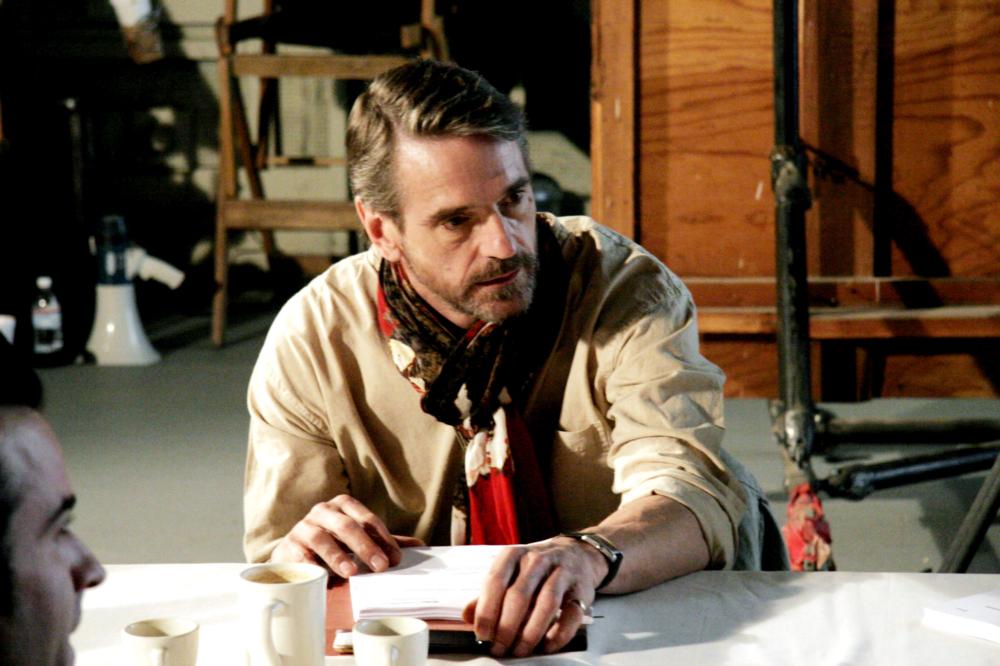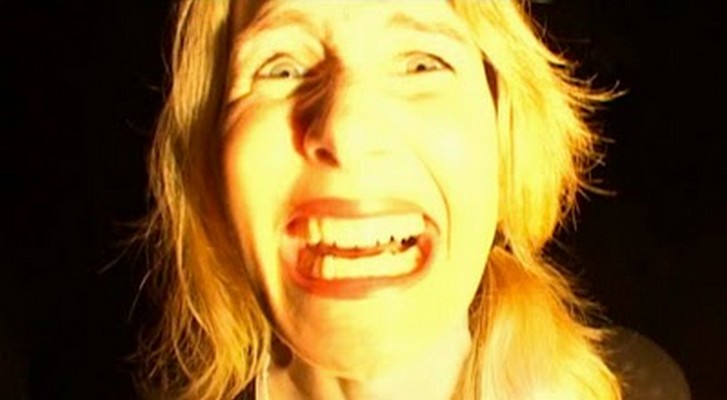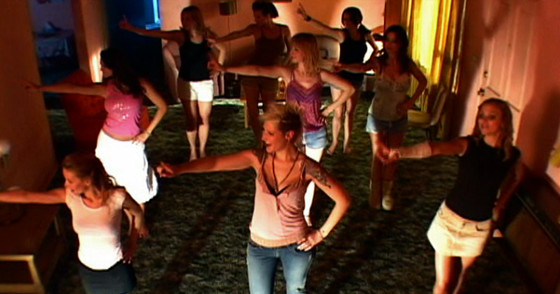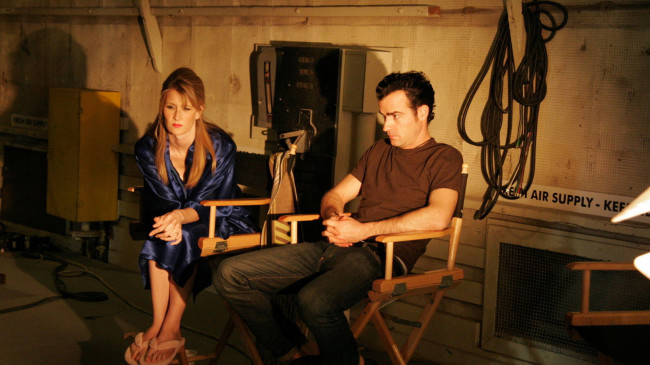4. Black humor

Michael Richardson writes that surrealist humor “is rarely comforting and often inclines toward a shadowy realm that Breton would theorize as ‘black humour’. It does not engage in wittiness or comic effect” and “tends to induce a feeling of discomfort even as it causes us to laugh. It arises from a determination not to take the world seriously and to treat our own position within it not as absurd but as strange and alien.”
Lynch is famous for his depiction of strangeness of life in his films, and black humor is one of the main aspects of his approach. The appearance of a neighbour in Nikki’s house at the beginning of the film is both strange and seems completely out of place. Her remarks provoke uneasiness in a viewer, especially her statement that a brutal fucking murder will take place in the film in which Nikki stars. Her facial expressions are discomforting, but in also humorous in a strange way.
Nikki’s husband lecturing Devon and explaining the meaning of the bonds of marriage, while grave music plays in its seriousness, seems like some kind of a black joke imposed both on Devon and the viewer. He says: “There are consequences to one’s actions. And there would for certain be consequences to wrong actions. Dark they would be, and inescapable.” When Sue talks to a man with glasses, telling him of her earlier life when she ripped off the testicles of a man who tried to rape her, it seems like a parody of a psychoanalytic treatment.
She talks about her traumas and violence that occurred as if they were some humorous enterprise. The scene looks both unsettling and strange in a way that may put an uneasy smile on the viewer’s face. When Sue runs from the man while he is making a call, she says “I’m afraid” in a grotesque and whimsical manner. She seems to make fun of her own situation (being murdered). Her behavior implies the surrealist notion of not taking life seriously, even if it could possibly end at that very moment.
5. Laura Dern’s performance

Laura Dern manages to play both Nikki and Sue, with great devotion to the vivid portrayal of the characters’ divergent personalities. As Nikki, she is gracious, elegant; and gentle. while as Sue, she is more crude and sometimes vulgar, but also confused about her own identity. She manages to depict a vast range of emotions that include fear, sadness, and the sense of being lost, both in time and with concern to her image of herself.
She is present in almost every scene of the movie, apart from the Polish episode, and her acting is an indispensable component of the film’s success. She presents energy and an ability to depict not only various states of mind, but also a wide range of attitudes of her characters toward their surroundings, ranging from calmness and composure to being distraught and frantic.
Dern collaborated with Lynch in “Blue Velvet” and “Wild at Heart”. The movies were a success, with the former being considered Lynch’s classic, but it may be claimed that Dern’s most successful performance in his movies is the one in “Inland Empire”. The film’s ambitions seem to be high, and only an actress of her rare talent could present the ideas of such magnitude in such a grand manner. To paraphrase Jeremy Irons’ character, she is wonderful.
6. Vividly depicts loss of identity

The theme of identity loss was particularly interesting for the surrealists, and Lynch often follows that line in his movies; for example, in “Mulholland Dr.”, which deals with amnesia. In his “Manifesto of Surrealism”, Breton enigmatically wrote: “Vaché is a surrealist in me.” Vaché was a young man encountered by Breton. He embodied a spirit of absolute revolt and even after his death, he became an important part of Breton’s identity. As Richardson writes, this destabilized Breton’s own identity in a form of a displacement.
Similarly, Sue assumes the identity of an actress, Nikki, and what is even more interesting, Nikki starts to question her own identity regarding the role she plays in the film. During the filming of a scene, she says: “This sounds like a dialogue from our script!”; she seems to confuse her role as an actress with the one of her “real life”. In one scene, Sue appears near the set looking at the other version of herself.
She runs from the set and enters a house, and looks through the window, screaming for Billy; at this moment, the transition between her identities occurs. In the next shot, the image blurs, then fades, only to reappear. She enters her bedroom and sees her husband, and thus her identity is symbolically regained, if only temporarily. Toward the end of the film, while the song “Black Tambourine” plays, Sue sees her own image laughing at her, shown in a close-up, suggesting displacement and the loss of her identity.
7. Juxtaposes different realities

French poet Paul Reverdy once wrote: “The image is a pure creation of the mind. It cannot be born from comparison but from a juxtaposition of two more or less remote realities. The more the relationship between the two juxtaposed realities is remote and true, the stronger the image – the greater its emotive power and poetic reality.” The main idea of “Inland Empire” can be seen as a series of juxtapositions of different realities. Those realities are Nikki’s and Sue’s and their relationship, which is particularly emphasized when Sue is watching the set of the film in which Nikki acts.
Toward the end of the film, when we believe that Sue is dying, it appears that she is on a film set; she gets up and is referred to as Nikki. At this moment, the two realities of Dern’s characters converge. Sue/Nikki sees herself in the movie theater, a projection of her earlier encounter with a man with glasses. In this way, the different realities are again juxtaposed. Soon, she encounters the Phantom, a character from a remote reality which is shown in the part of the film concerning events in Poland, and murders him; we witness the juxtaposition of the two realities shown during the film.
The Lost Girl is crying and watching television, seeing Sue, and in the next scene they come together and kiss each other. The final scenes show Sue and Nikki in her mansion. To follow Reverdy’s argument, the strength of “Inland Empire” and its emotional power, which is shown in all its grandeur in the final scenes while ethereal music is playing, is precisely in the juxtapositions of various realities, and the emphasis on their relationships. During the film, they are more or less distant, but in the end they come together, creating a powerful impression.
Author Bio: Hrvoje Galich is a student of political science and writes expressionist poetry. He believes that Tristan und Isolde is the most beautiful artistic piece in the history of man. He loves movies by Andrei Tarkovsky, Michelangelo Antonioni, Ingmar Bergman and Shohei Imamura. He adores his cat “Meow”, the only cat in the world that can say her name.